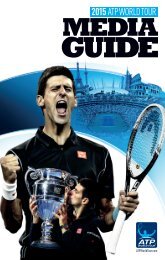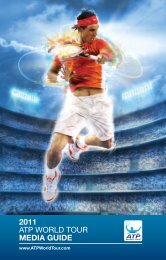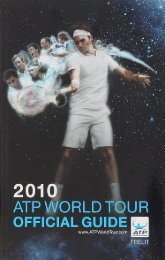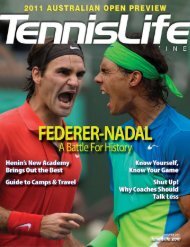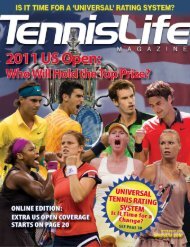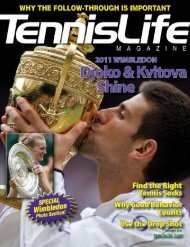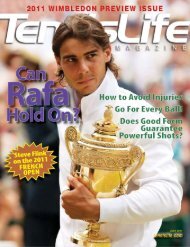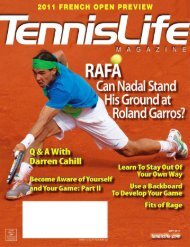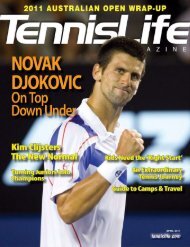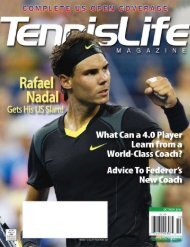A Champion's Mind - Pete Sampras
www.tennismoscow.me Insta:TENNISMOSCOW
www.tennismoscow.me Insta:TENNISMOSCOW
Create successful ePaper yourself
Turn your PDF publications into a flip-book with our unique Google optimized e-Paper software.
aluminum bleachers on one side of the court. (In contrast, the “field” courts, where they usually put<br />
obscure players, have very little seating room.) But it was first-come, first-served seating at 13, and<br />
anyone who had a ticket or pass that got him onto the Wimbledon grounds could stake out a place there.<br />
That meant the most passionate and enthusiastic fans would be there, but also the rowdiest, most partisan<br />
—and most inebriated.<br />
The matches scheduled before ours went long, so it was early evening by the time Foster and I took the<br />
court. That gave fans plenty of time to lube their pipes with British lagers or the traditional fruity Pimm’s<br />
cups. I was determined not to get into a war out there, because that’s just the kind of situation that could<br />
spin out of control. I played nearly flawless tennis to win the first two sets, losing just three games.<br />
But Foster, stoked out of his gourd by the occasion and the vocal fans, hung tough in the third set. We<br />
stayed on serve through six, eight, ten games—by which time the crowd, sensing life in Foster, was really<br />
getting into it. It was also getting toward twilight. All the elements that a favorite dreads were falling into<br />
place: lousy conditions, unruly fans, a lead that could slip away.<br />
Still, I figured that in the worst case I could just extend the match until it was called because of<br />
darkness, and regroup to put the guy away the following day. But something inside me didn’t want to do<br />
that. Something in me really wanted to bear down, dig deep, and put the guy out. This was part of wiping<br />
away that bitter aftertaste that had lingered in my mouth after the last U.S. Open final. Foster was no<br />
Edberg, and Court 16 was not Louis Armstrong Stadium, but in its own way this was a pivotal moment for<br />
me.<br />
I hung in there and got to the tiebreaker, where I took care of my serve and greased out a few returns to<br />
stop Foster’s run. As soon as I won match point, I flung my arms in the air, turned to the crowd, and<br />
yelled, “Take that, you motherf#$@&%rs!”<br />
The photographers courtside heard exactly what I said and, in England, where the tabloid press is a<br />
real force, that spelled trouble. The “Fleet Street boys” (and girls) who write the tabs are exceptionally<br />
good at digging up information and blowing up routine incidents into front-page news. One of their<br />
favorite tricks at Wimbledon is working hand-in-hand with the photographers, who are positioned much<br />
closer to the action than the writers. In fact, they can hear and see just about everything a player says or<br />
does during a match. And they definitely heard my taunt, even if most of the fans it was meant for did not.<br />
When I went to my press conference, I felt relaxed and proud. The front row was filled with guys who<br />
were very well dressed, for reporters. It’s one of those crazy ironies that the people who write the most<br />
tacky and irresponsible stories in the British tabloids always dress impeccably, right down to wearing<br />
pocket handkerchiefs or flowers pinned to their lapels. And so this one perfectly attired guy says, in his<br />
perfect British accent, “Is it true that you called the British crowd a group of ‘motherf#$@&%rs’?”<br />
I froze up. It hadn’t even occurred to me that this could be a big deal. I’ll never forget the discomfort I<br />
felt at that moment—or that I wussed out. I flat-out denied having said what I did. It maybe wasn’t the<br />
right thing to do; I felt funny about it. But the last thing I needed was to get in a big fight over a thoughtless<br />
remark tossed out in the heat of combat. Not that my denial mattered—the incident was all over the papers<br />
the next day anyway, and suddenly it seemed that all of England hated me. Put it down to a thoughtless<br />
comment—and the power of the tabloids.<br />
Of course, the toughest part of my 1993 Wimbledon still lay ahead of me: a quarterfinal pairing with the<br />
defending champ and my emerging rival, Andre Agassi. We had a tense, high-quality struggle, with<br />
multiple service breaks. The match went down to the wire, see-sawing right into and through most of the<br />
fifth set. To my advantage, Andre looked like he was feeling the pressure of defending his first Grand<br />
Slam title, and the surface was playing fast. I knew I could take care of my serve; it was just a matter of<br />
finding a way to break. It was a very high quality match, but the air totally went out of it when I finally got<br />
a break late in the fifth set and then served it out.<br />
I played Boris Becker in the semifinals; he was already a multiple Wimbledon champion and an




